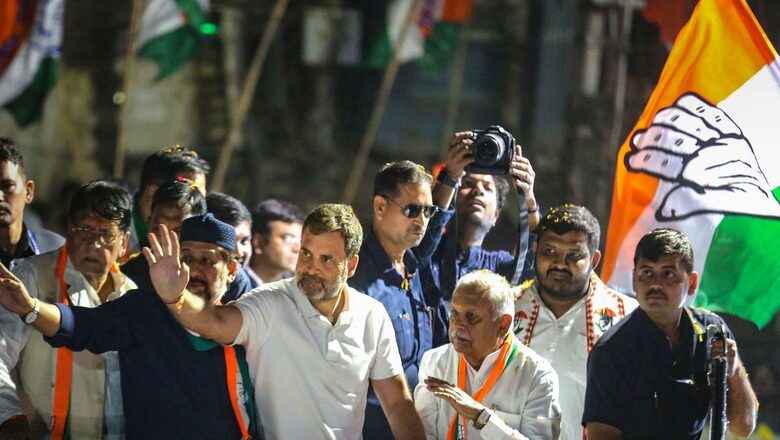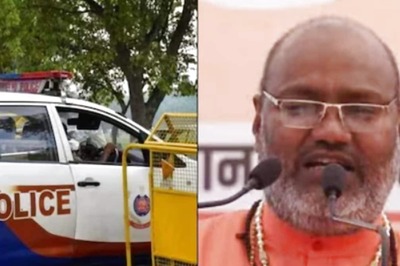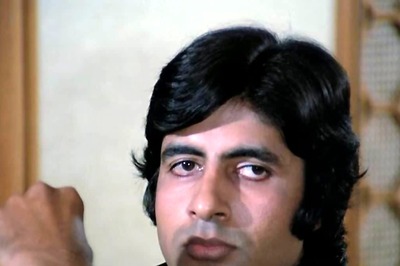
views
The recent electoral catastrophe in Rajasthan, Madhya Pradesh, and Chhattisgarh brutally exposes the chronic leadership quagmire engulfing the Congress party. Despite a flicker of hope emanating from their triumph in Telangana, the resounding defeat hammers home a pivotal lesson: the desperate need for the Congress to cultivate robust local leadership armed with a nuanced, region-specific narrative.
Alas, the party’s addiction to centralised control and its archaic high command structure persist like stubborn stains, illuminating the urgent requirement for an unflinching bout of introspection and strategic realignment. The Congress, a party boasting a storied legacy, finds itself at a crossroads, grappling with the relentless aftermath of electoral failures. The glaring truth is that despite pockets of success, the grand old party is haemorrhaging in its traditional strongholds. The resolute grip of centralised power and unwavering allegiance to the high command has shackled the party, rendering it incapable of adapting to the diverse socio-political landscapes across states.
The Telangana victory should not be a fleeting mirage but a glaring signpost pointing towards a necessary paradigm shift. The Congress must unshackle itself from the clutches of an outdated modus operandi and embrace the essence of regional leadership, acknowledging that a cookie-cutter approach to governance and campaigning is a one-way ticket to irrelevance. The electoral drubbing is not just a defeat; it is a resounding call for metamorphosis. The Congress, if it wishes to reclaim its lost eminence, must shed its affinity for centralisation, champion the cause of local leadership, and craft narratives that resonate with the unique pulse of each region. The time for superficial introspection is over, a seismic recalibration is the need of the hour. Up until that point, the grand old party runs the risk of becoming a memory due to its inability to change in a time that demands authenticity and dynamism.
Dealing with questions against Mallikarjun Kharge
The Congress party finds itself at a strategic crossroads, necessitating a shrewd game plan to address the mounting criticism against its president, Mallikarjun Kharge. Despite the resolute backing from the Gandhi family for his leadership, the inevitable internal pressures may attempt to cast him as the sacrificial lamb for the party’s recent defeat. It becomes imperative for the Congress to tread cautiously, shielding not only Kharge but also ensuring that other competent leaders are not unjustly shouldered with the blame, solely to safeguard the Gandhi family’s image.
In this delicate balancing act, the Congress must resist the temptation to succumb to internal pressures seeking a convenient scapegoat. The party’s resilience lies in a judicious and principled response that upholds accountability while steering clear of the pitfalls of sacrificing capable leaders for political expediency. The strategic imperative is clear: protecting the party’s leadership ensemble from unwarranted blame games is not just an exercise in self-preservation but a vital step in fortifying the party’s credibility and resilience.
Grassroots Disconnect: The Messaging Quandary
The Indian National Congress (INC), once the undisputed champion of India’s political landscape, finds itself grappling with a critical disconnect from the very people it seeks to represent. The recent electoral debacles in Rajasthan, Madhya Pradesh, and Chhattisgarh serve as stark reminders of the party’s failure to effectively communicate its message to the grassroots, leaving a yawning chasm between the party’s narrative and the aspirations of the electorate.
The INC’s messaging has often been fragmented and poorly disseminated, failing to resonate with the concerns and aspirations of ordinary people. This disconnect stems from a lack of effective communication channels and a failure to adapt to the changing media landscape. The party’s reliance on traditional methods of communication has left it lagging behind in the digital age, where information flows at an unprecedented pace.
The time for complacency is over. The INC must confront the glaring reality of its disconnect with the grassroots and take concrete steps to bridge this gap. Establishing a robust system for information dissemination is imperative, one that utilises the full potential of technology and social media to reach every corner of the country. Investing in a mechanism that ensures the seamless transmission of the party’s narrative is no longer a luxury but a necessity. The INC must create a network of grassroots communicators, trained and equipped to articulate the party’s vision in a language that resonates with the people.
This requires a fundamental shift in the INC’s approach to communication, moving away from top-down directives and embracing a more decentralised, grassroots-driven model. Only by bridging the communication divide can the INC hope to reconnect with the electorate and regain its lost ground. The party must seize this opportunity to reinvent its communication strategy, embrace the power of technology, and empower its grassroots communicators to become the voice of the INC, ensuring that its message reaches every corner of the nation.
Prioritising party goals over personal ambitions
The Congress stands on the charred grounds of defeat in Rajasthan, Chhattisgarh and Madhya Pradesh, and the lesson etched in the ashes is crystal clear: personal ambitions are the perilous quicksand that swallows party success. In Rajasthan, the power tussle between Ashok Gehlot and Sachin Pilot escalated as personal assertions trumped party unity. Rahul Gandhi, in his bid to be the kingmaker, further muddled the narrative. The Congress must now shed its self-defeating penchant for prioritising individual ambitions over the party’s collective interests.
The BJP, in stark contrast, presents a masterclass in cohesive unity. While the Congress spiralled into an abyss of internal power struggles, the BJP’s leaders spoke in unison, presenting a formidable and disciplined front. The Congress must take a page from this playbook, recalibrating its priorities to ensure the party’s interests reign supreme. The bitter taste of defeat should serve as a potent reminder that personal ambitions, when unchecked, become the Achilles’ heel that cripples the Congress’ march towards electoral triumph. It’s time for a recalibration, a prioritisation of the party over individual aspirations if the Congress aims to rise from the ashes of its own making.
Reviewing Political Strategy: Seeking Cohesion in Diversity
It is evident that the Congress party is grappling with a crucial lesson that cannot be ignored or overlooked any longer. The need for a cohesive and unified political strategy has become an imperative necessity for their survival and relevance in the current political landscape. The absence of a unified voice within the party has been nothing short of glaring, as leaders have been seen diverging on crucial issues and narratives during the recent campaign.
In stark contrast, the BJP, their political adversary, has showcased a level of discipline and unity that is unparalleled. Their leaders have seamlessly echoed a singular narrative, leaving no room for doubt or confusion. It is this disciplined approach that has made the BJP stand out and achieve remarkable victories time and again.
Therefore, it is high time for the Congress party to embark on a comprehensive and introspective review of its political strategy. This review should not only focus on identifying the shortcomings and weaknesses but also on repairing and reinventing the party’s approach. The Congress must foster a harmonised and coherent approach where leaders are aligned on critical issues and communicate a unified message to the public. This process of review, repair, and reinvention should not be taken lightly. It requires a serious commitment from the party’s leadership to address internal conflicts, streamline decision-making processes, and create a strong and effective high command structure. Without these fundamental changes, the party will continue to falter and lose ground to its opponents.
In conclusion, the Congress party must recognise the importance of a cohesive and unified political strategy. It is only through a comprehensive review, repair, and reinvention of their approach that they can hope to regain their lost ground. The time for introspection and change is now, as the political landscape continues to evolve. Adaptation is key, and it is crucial for the Congress to embrace this necessity if they wish to revive their political fortunes and reclaim their position as a formidable force in Indian politics.
Dismantling the High Command Structure: An Urgent Necessity
The Congress party, reeling from the blows of electoral setbacks, confronts a glaring truth: its high command structure stands as an impediment to progress. The inability to quell internal strife in states like Rajasthan and Chhattisgarh lays bare the systemic flaws of a high command that crumbles under the weight of prolonged infighting. The domineering approach of the Gandhi family and the centralised control model have emerged as architects of the party’s misfortunes.
The time for a reckoning has arrived. The Congress must confront the inherent inadequacies of its high command structure and usher in an era of inclusivity and decentralisation. The failure to adapt to regional dynamics has been a millstone around the party’s neck, impeding its resurgence. A more dynamic and decentralised approach is not just a strategic choice; it’s a survival imperative. The Congress, if it desires a phoenix-like rise from the ashes of its electoral disappointments, must shed the shackles of an antiquated high command and embrace a more agile, region-centric model. The path to redemption lies in dismantling the faulty high command structure, allowing the party to rise anew, attuned to the diverse beats of regional politics.
A Crossroads for Congress
The Congress party finds itself at a critical juncture, grappling with an array of crises that demand urgent and resolute action. The party’s leadership quandary, disconnection from the grassroots, poisonous rivalries fuelled by personal ambitions, strategic chaos, and the abysmal failure of the high command structure have coalesced into an insurmountable challenge. The Congress must now embark on a profound journey of soul-searching and radical restructuring, discarding the remnants of archaic practices and adopting a more adaptable, decentralised, and united approach. The defeats suffered in recent elections must serve as a clarion call for transformation, providing the Congress with a rare opportunity to redefine itself as a vibrant and responsive political powerhouse.
The time for half-measures and excuses is long gone; only through a concerted effort to introspect, reorganise, and reinvigorate can the Congress hope to reclaim its rightful place in the political landscape. Failure to take immediate and bold action will only cement the party’s irrelevance and hasten its demise. The Congress must rise to the challenge or be consigned to the annals of history as a relic of bygone days.
The author, a columnist and research scholar, teaches journalism at St. Xavier’s College (autonomous), Kolkata. He tweets at @sayantan_gh. Views expressed in the above piece are personal and solely that of the author. They do not necessarily reflect News18’s views.



















Comments
0 comment